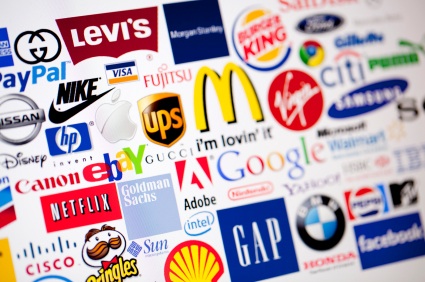You are out food shopping. You need to buy ketchup and cornflakes. On the shelves there are number of brands to choose from. Hands up everybody that would choose Heinz Ketchup and Kellogg’s cornflakes.
The majority of consumers are loyal to brands that offer us a perception of quality. Generally we do not like to take risks and purchase unfamiliar brands with unfamiliar logos.
Some brands are so well known and trusted that the brandname have now become the name of the generic product. Hoover, Rollerblades, Sellotape, Jacuzzi, Biro, Blue tack, Photoshop, Rizla and Kleenex are just a few that have become synonyms with the general product or service. Escalator is probably the most prominent one.
What many of these brands have in common is that they were the first on the scene and backed by a lot of advertisement.
30% of the world’s 100 most valuable brands were developed before 1900.
So do brands play a role in our society?
Let’s explore how brands and non brands are playing a role in society.
Referring back to Heinz Ketchup and Kellogg’s cornflakes, it is fair to say that we associate these brands with the quality of their product. Most of us believe that Heinz makes better Ketchup than any other brand and Kellogg’s produce the best cornflakes.
However when it comes to clothing and automotive, brands play another role other than just the perception of quality, it also conveys a message of social status to others. When it comes to running shoes for example, usually Nike plays the part and for Wellies, Hunter is the top of the range. A designer brand can tell us how expensive an item is and it can also give a perception of who the person is wearing it. We would surely think that a woman in Louboutin heels, carrying a Louis Vuitton hand bag, wearing Chanel sunglasses in an Armani suit is well off and maybe a successful business woman. We would probably also make the assumption she has a great social life.
In a research piece about brands by hubpages they quote popular culture expert Thomas Hine who states that “Designer labels are not really about design, they are about branding” .
The concept of brands and the perception of its quality is very clear when it comes to cosmetics. Face moisturisers vary a lot in prices depending on their branding. A Clinique cream is five times the price of Nivea. With food you can measure the difference in taste and with clothes the quality, but with cosmetics how much does the quality of the cream really differ?
When it comes to automotive, brands seem to play an even more important role in consumer perception and status. A Porsche gives a different impression to a Volvo. Cars portrays financial status. Someone with a lot of money is more likely to buy a car that portrays their wealth, as a status symbol and to impress.
With technology it is less about the quality and social status of the product and more about the popularity of the brand. Ipod is by far the most popular mp3 on the market. Look back 20 years and the Walkman’s were the most popular. There are probably a lot of mp3 brands that offer similar levels of quality as the ipod, however the ipod is the most fashionable and well known.
Brand Identity
In January this year Selfridges launched a project called ‘No Noise’. They dropped the names on high profile brands. Famous brands including Heinz, Marmite, Levi’s and Acne produced limited editions of their products with no brand names on the packaging. The project celebrated the power of quiet.
This clearly showed that it was only the strongest brands that could lose their visual branding but still keep their identity. These products would have lost their value and desirability if it wasn’t for their powerful branding. Investing in brand-building had paid off handsomely for them. Marmite pots for example, with their yellow, red and green label was instantly recognisable even without the brand name displayed
A brand can always raise the price of a product even though the quality might not be any higher than competitors. Some brands have managed to gain the reputation they have through years of marketing or simply because they were the first on the market and when first introduced have had a remaining impact on consumers since.
Emotional connection
Every part of our lives from the food we eat to the clothes we wear, all trace back to a brand.
As consumers, we tend to cling to the brands we liked as children. Familiar brands helps us save time when we go shopping. This ensures we are not wasting our money and purchasing the right things.
More importantly then, a brand is an emotional connection you have with a product or service. This connection with the brand comes from satisfaction. If a brand satisfies a person’s preference or need then that person will go for it all over the time. We become brand loyal because we prefer the qualities and characteristics of it.
In this age, we are influenced about the brands around us. A brand distinguishes a product from the other. We judge the quality of a product and its value by its name. If the product is branded it gives us confidence and satisfaction which a unbranded product does not.
According to Charles Wright, Managing Director of Wolff Olins, brands are increasingly becoming more conscious about their existence in a consumer’s mind space. Brands need to move into the comfort zone of a consumer, where a strong emotional bond can be produced between the two. We believe this emotional connection will be created through experiential marketing. Experiences leave lasting impressions and by creating a brand story-based experience, you will create brand advocates. Your brand will mean much more to its audience if you give them an experience.
Hotcow is a multi-award winning Experiential Marketing agency. We get brands in front of consumers in ways that persuade them to buy and become advocates. We call this the Moo Woo Wow™ factor – It is about being ‘heard’, being ‘convincing’ and being ‘unforgettable’. We fully implement our ideas; nothing needs to be farmed out. For more information or free consultation, contact us



